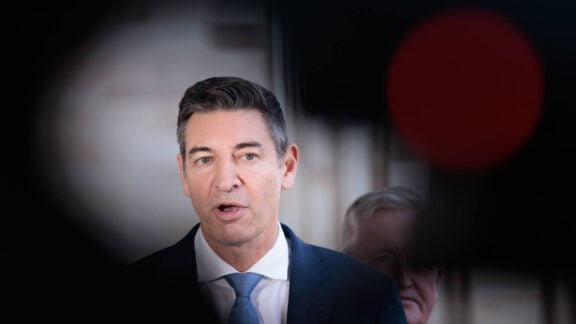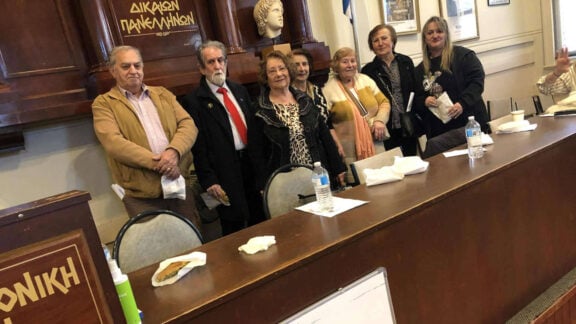The Australian Hellenic Educators’ Association (NSW-ACT-QLD) celebrates the International Day of the Hellenic Language today, 9 February.
It was on this day back in 1857 when Hellenism’s National Poet Dionysios Solomos passed away. To honour the service of the composer of the National Anthem, this day has been named International Day of the Hellenic Language.
The Australian Hellenic Educators’ Association committee has chosen to bring an iconic speech made by the former Prime Minister of Australia Gough Whitlam in 2005 to the NSW Teachers of Modern Greek Association back to light.
The title of the speech was ‘Philhellenes And Philologists’, and it aimed to remind educators and students of Hellenism alike of the value of the Hellenic language in 21st century Australia.
Philhellenes and philologists
The ancient Greek gods are alive and well. Athena and Phevos will make the awards at today’s ceremony in Bankstown. Last year their images presided over the splendid Olympics in Athens. Throughout Australia the Governor-General makes more and more appearances as Zeus to express his omnipotence. A generation ago a Governor-General whom I had chosen made an unforgettable appearance as Bacchus to present the Melbourne Cup at Flemington in Victoria.
The matters on which I should address you are: (a) how important is the Greek language in Australia? And, (b) how important is Greek civilisation to Australia?
Australia’s leaders, diplomats, educators, and opinion-formers tend to embrace automatically the UK and US – the North Atlantic – perspective on the Balkans and to discount the full range of knowledge and tradition available within Australia itself. There are more people in Australia than in the whole US and UK who are familiar with the politics and traditions of the Balkans and with ancient, Byzantine and modern Greek.
As Prime Minister I ensured that all roads led not only to Rome but also to Athens. In January 1975 I was the first foreign Head of Government to be received by Konstandínos Giórgiou Karamanlis, the first Prime Minister of the second Hellenic Republic; I invited him to visit Australia and seven years later he came as President.
Two months ago John Howard went to Athens and delivered a Philippic against Peter Costello. I may have thought I was Pericles but John Howard must have thought he was Demosthenes. At least I learned the meaning of two Greek words 30 years ago. The Greeks used demokratía for both republic and democracy and praxikópima for coup d’état. (Australians had one later that year.)
I developed an interest in ancient Greece and Greeks when my father introduced me to the Reverend Charles Kingsley’s 1856 book The Heroes, which gave modest accounts of the adventures of Perseus, Theseus and Jason.
I developed an interest in modern Greece and Greeks in 1924 when I was 8 and starting to collect postage stamps. I got two Greek stamps inscribed ‘Lord Byron’. They were issued by the first Hellenic Republic to commemorate the centenary of Byron’s death at Mesolongi. In the 1930s at school in Canberra and at the University of Sydney I became familiar with the poems of Byron. He excoriated Lord Elgin in The Curse of Minerva, written in Athens in March 1811; he admired the plunder but abhorred the thief.
All Australians are involved with Greek words. We can study mythology and theology, astrology and astronomy, mystery and history. In politics and economics we can be rhetorical, ethical, theoretical, or practical, idealistic, autarkic, academic, plutocratic or dogmatic. In poetry we can write epics, lyrics, bucolics and parodies in trimeters, tetrameters, pentameters, hexameters and heptameters. In mathematics we can excel in geometry and trigonometry and assess physical phenomena. In theatres we have Doric, Ionic or Corinthian columns and can enjoy dramas, tragedies and comedies, symphony orchestras, melodies and music of all kinds. In philosophy we can be skeptics, cynics, stoics and epicures.
In medical circles the names of the intimate male and female body parts are mostly Latin words and the names of the diseases arising from their careless interaction are mostly Greek words. In religious circles we distinguish between Greek words such as patriarch, exarch, metropolitan, ecumenical and autocephalous and Latin words such as uniate, ex cathedra, in partibus and filioque. In military history we remember Greek place names. Sebastopol, ‘the city of the Empress’, was named after the Russian Empress Catherine the Great, who liberated the Crimea from the Ottoman Empire. Gallipoli, ‘beautiful city’, is found not only near the Hellespont but also in Magna Graecia on the route from Otranto to Taranto.
There can be no doubt that the Greek language is important in Australia and that Greek civilisation is important to Australia.
Find the full address by Gough Whitlam here.







